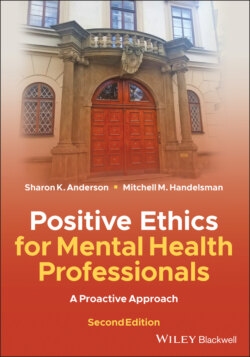Читать книгу Positive Ethics for Mental Health Professionals - Sharon K. Anderson - Страница 42
Food for Thought: Your Own Invisible Knapsack of Privilege
ОглавлениеSometimes it is uncomfortable to think of ourselves as having advantages in life or as living with unearned assets that provide us opportunities that others do not have. We’d like to give you an opportunity to explore what might be in your own “knapsack of privilege” by assessing how your experience matches the statements below. The more you respond in the affirmative, the more likely you are to have one or more points of privilege (gender privilege, able-bodied privilege, economic privilege, heterosexual privilege, religious privilege, White privilege, etc.).
In meetings or gatherings, my ideas or comments are recognized.
I can expect to earn my pay based on the work I do—equivalent to what my colleagues earn.
I can go out to a place of business, a restaurant, or an event and not worry about accessibility.
I can go to restaurant or movie and not need someone to read the menu or list of showings.
I can plan regular trips to the grocery store without concerns of how I will pay the bill.
I can travel, purchase items, go out for entertainment (i.e., have financial resources) without concern about how I will purchase the necessities for daily living.
I can speak in public and not have someone ask me where I am from.
I can hold my partner’s hand in social contexts without concern.
I can go to public places and not have people question my gender.
I can attend the church or place of worship I desire.
I can speak for myself as an individual and not feel like I am representing a group of people with my same skin color (or gender, religion, etc.).
I can find plenty of literature that highlights my heritage.
Without some prompting, we might remain oblivious to our invisible knapsack of privilege. This state of unawareness may be an outcome of learning. McIntosh states it this way: “As a White person, I realized I had been taught about racism as something that puts others at a disadvantage, but had been taught not to see one of its corollary aspects, white privilege, which puts me at an advantage” (p. 31). Dr. McIntosh is not alone in this experience. In our personal contexts, we may have not learned to notice those ways we have “advantages,” and may just come to see them as the expected. When we don’t see our own points of privilege, we will likely find it difficult to see discrimination against others and the ways we are participating in systems of oppression (Loomis, 2011; Zetzer, 2018).
The examination of personal points of privilege, oppression, and discrimination relates to the larger issue of social justice—how we implement personal virtues (e.g., respect, humility, compassion, fairness) and values on a broader scale. Being able to see our privilege—and how we have unknowingly and maybe knowingly contributed to systems of discrimination and oppression—can help us actualize our virtues and values, achieve ethical excellence in our personal and professional lives, and avoid harm to our clients.
We are not suggesting feeling guilty or ashamed of being a White person or having other points of privilege (Spanierman et al., 2009). Rather, we are encouraging you to be aware and to develop understanding about racism and other isms, the cycles of socialization and systems of oppression, and cultural humility . Cultural humility is an attitude and a “way of being” with diverse clients that values the presence and importance of cultural factors (Owen et al., 2011, p. 274) and works toward genuine respect and understanding persons as cultural beings. We might suggest that cultural humility also includes being aware of our privilege and acting to dismantle the systems of oppression in which we have been participating.
